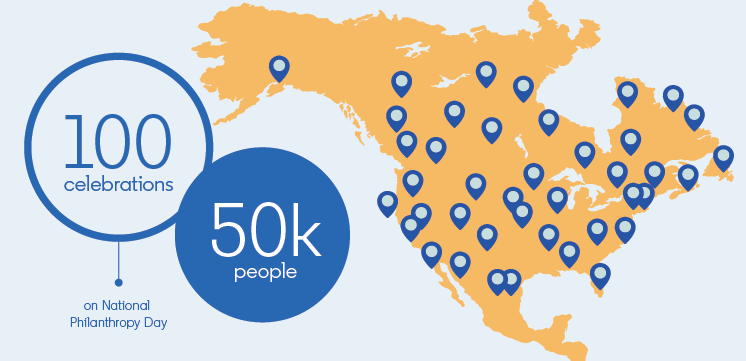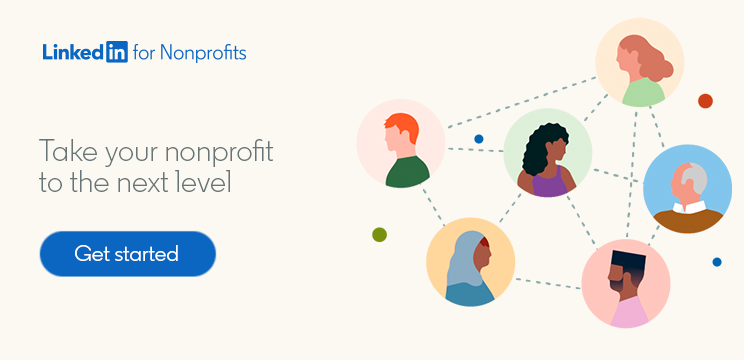
National Philanthropy Day®: Everyone Can Be a Philanthropist
Philanthropist. It sounds like a word of privilege, as if only people who give millions of dollars can be philanthropists.
But the truth is much different. Philanthropy comes from the Greek language, literally meaning “love of humankind.” As the president and CEO of the Association of Fundraising Professionals (AFP), the largest community of charitable fundraisers and nonprofits in the world, I like to think of philanthropy as meaning “voluntary action for the common good.”
Whatever definition you use, it’s clear that philanthropy is for everyone who cares about their neighbor, their community, their society, and their world. Everyone can be a philanthropist and make a difference through giving and volunteering—sharing our talent, time, and resources. In fact, human nature drives us to be philanthropic. We humans are inherently, and over time, collaborative and supportive. We cannot survive as a society if we are confrontational and destructive.
Approximately $450 billion was given to nonprofits in America last year, and a large percentage of that amount came from individuals giving contributions in the range of $20 - $100. We also have new research which shows that COVID-19 relief giving is being led by everyday Americans donating whatever they can to help others—even as they face their own challenges because of the pandemic. Philanthropy in America thrives because of the incredible generosity of countless people across the country—giving, volunteering, helping others, and engaging with the causes they support. And that’s what we celebrate on November 15, National Philanthropy Day®—the incredible work that everyone, no matter how much they give, performs to make our communities, our country, and our world a better place. But nonprofits aren’t just about programs and services anymore. Consider all the major social initiatives, campaigns, and policy changes that have occurred in our country and around the world for the past 50 years. For the most part, who has led those? Nonprofits! They work on almost every conceivable issue now, including violence prevention, standards of living, the economy, government productivity, education reform, and every kind of scientific and technological advance.
Here’s another way to think about philanthropy. Consider what it takes for someone to be charitable. To engage in philanthropy requires a country where wealth creation is encouraged and widespread. It requires a government that allows people to congregate together and create their own kinds of organizations that meet their community needs. Essentially, philanthropy is an expression of basic human rights and freedom. It strengthens the ideas of justice, ethics, and democracy. These aren’t just flowery words—philanthropy is a real and concrete way we support a free and engaged society.

In a typical year, more than 50,000 people would come together in more than 100 National Philanthropy Day celebrations held by AFP chapters across North America, recognizing generous and committed donors, volunteers, businesses, foundations, and young people involved in philanthropy. Of course, with the pandemic, this is not a typical year. National Philanthropy Day celebrations are being held virtually this year, and you can find local celebrations across North America here. In addition, AFP Global is holding a great online event on November 12. I encourage you to check it out and attend.
Given the type of year it’s been, you might be wondering how you can encourage people to get involved and be a philanthropist despite the pandemic. Here are a few ideas.
- Encourage people to plan their giving. By taking a little time to determine which organizations they want to support and when/how much they’ll give, people can feel more comfortable in their giving—and know it’s having the maximum impact.
- Spread awareness that their employer may match their gift. Not all employers do so, or they may only match a portion of the gift, but it doesn’t hurt for people to find out, and it may be an easy way for them to double their impact. Some employers might offer employees time off to volunteer as well.
- Highlight that people can ask for charitable contributions instead of gifts for their birthday or other special event. Many donors use social media to explain why they’re asking people to make contributions to their favorite nonprofit, and some platforms, such as Facebook and Instagram, even allow people to donate directly via the platform.
- Promote payroll giving, or giving a little bit each month. A $100 gift might sound like a lot at one time, but what if donors gave a little part of that each month? A small $10 per month is a $120 annual gift to their favorite cause. They may be able to have that amount come directly out of each paycheck, or just set aside a little bit each month.
- Spotlight giving circles. Donors can get their friends together, discuss common interests, agree to a certain amount each person gives to the circle, and then determine which nonprofits will receive the pooled gift. Informal yet focused giving circles are a great way to bring friends together and dramatically increase the impact of individual philanthropy.
- Request donations of clothing and other goods (if you or an organization you partner with takes them). Clothing and other goods, including furniture, electronics, appliances, and linens, are ALWAYS needed—as are donations of food. People tend to give food during the holidays season, but local shelters and nonprofits need food donations all the time. When your supporters are out shopping, encourage them to buy a couple of extra items!
Your supporters probably have their own ideas for giving, too. Whatever it is they decide to do, make sure they know that their involvement will mean a world of difference for someone—and by extension, for their community, our society, and our world.
As we celebrate National Philanthropy Day this month, I want to thank you for getting involved in the nonprofit sector. Your efforts count. Your work is powerful. Everyone can be a philanthropist, and everyone’s philanthropy makes a huge difference in the world.

